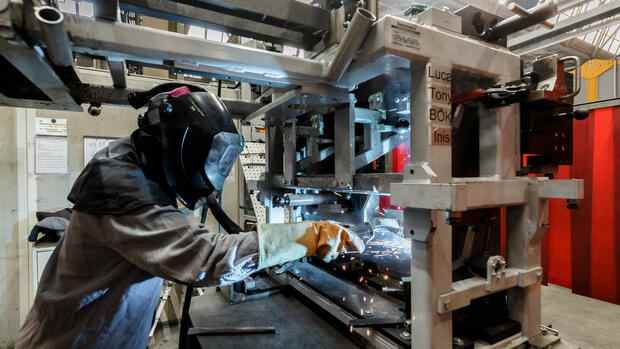A gas shortage could lead to a production standstill in 18 percent of companies in the metal and electrical industry.
(Photo: dpa)
Berlin About every sixth company in the metal and electrical industry sees its existence threatened by the sharp rise in energy costs. This is shown by a quick survey by the employers’ association Gesamtmetall among around 1,400 companies, which together employ around a quarter of the employees in the industry.
A further 68 percent of those surveyed stated that they were severely affected by cost increases. “The energy crisis is hitting companies in the metal and electrical industry with full force – across all sectors and sizes,” said Oliver Zander, General Manager of Gesamtmetall, when the results were presented.
In the current collective bargaining round for the approximately 3.9 million employees in the key industrial sector, employers and trade unions are currently trying massively to promote their position. The IG Metall started the negotiations with the demand for eight percent more money and refers to the high inflation and the good order situation in the industry.
Employers emphasize that the situation varies greatly from company to company and that small and medium-sized companies in particular should not be additionally burdened by a high wage agreement. Because the purchasing costs of companies would have increased by 65 percent in 2022 compared to the previous year, and more than doubled for electricity and gas.
Top jobs of the day
Find the best jobs now and
be notified by email.
Last week, IG Metall presented the results of a works council survey. According to this, three quarters of those surveyed drew a good or very good picture in terms of capacity utilization, the order backlog and incoming orders in their company. About two thirds of the companies also reported good or very good sales. A mixed picture emerged for profits and investments.
Employers engage in “scaremongering”
In addition, a good two out of three companies are able to pass the increased costs on to their customers, at least in part. IG Metall boss Jörg Hofmann had therefore accused the employers of “scaremongering”. The tariff demand is reasonable and obviously feasible for the companies.
IG Metall boss Jörg Hofmann accused the employers of “scaremongering”.
(Photo: dpa)
Implementing the eight percent requirement would burden employers – including their share of social security contributions – with around 20 billion euros. However, in an interview with the Handelsblatt, Gesamtmetall President Stefan Wolf had already pointed out that in a recession phase, as is expected for the coming year, the order backlog would melt “like ice in the sun”.
The association is now substantiating this fear with the survey results. According to this, half of the companies surveyed are already affected by cancellations or postponements of orders – 21 percent already to a large extent. Another almost third of the companies expect cancellations in the coming months.
Opinions between employers and trade unions also differ on the possibilities of passing on increased prices to customers. The total metal survey shows that almost seven out of ten companies see themselves in a position to do so.
>> Read the interview with Stefan Wolf here: “Order backlogs are melting like ice” – Gesamtmetall boss brings zero round for millions of employees into play
Only about every eighth company surveyed manages to cover their costs. There is a great deal of uncertainty here, especially in the automotive industry.
IG Metall is preparing for a labor dispute
In the two previous rounds of collective bargaining conducted at the regional level, the employers have not yet submitted an offer. Employers insist that companies can automatically deviate from the collective agreement if certain business ratios are not reached. They also demand that the parties to the company be able to allow the volume of recurring services such as vacation or Christmas bonuses to fluctuate if the operational situation requires this.
Wolf also emphasized in the interview that he believes there must be a zero round if Germany gets into a gas shortage. According to the survey, 90 percent of companies in the metal and electrical industry would be affected. In 18 percent of the companies there was even a threat of production downtime.
>> Read also: Highest tariff demands for years – is the wage-price spiral now looming?
The third round of negotiations at regional level will take place on October 27th and 28th. The peace obligation ends on October 29, when warning strikes are possible. The employers had not submitted an offer even after two rounds, criticized the IG Metall district manager in Baden-Württemberg, Roman Zitzelsberger. “For us, this means that we are preparing with full vehemence for a conflictual dispute.”
More: Highest tariff demands for years: is the wage-price spiral now threatening?
